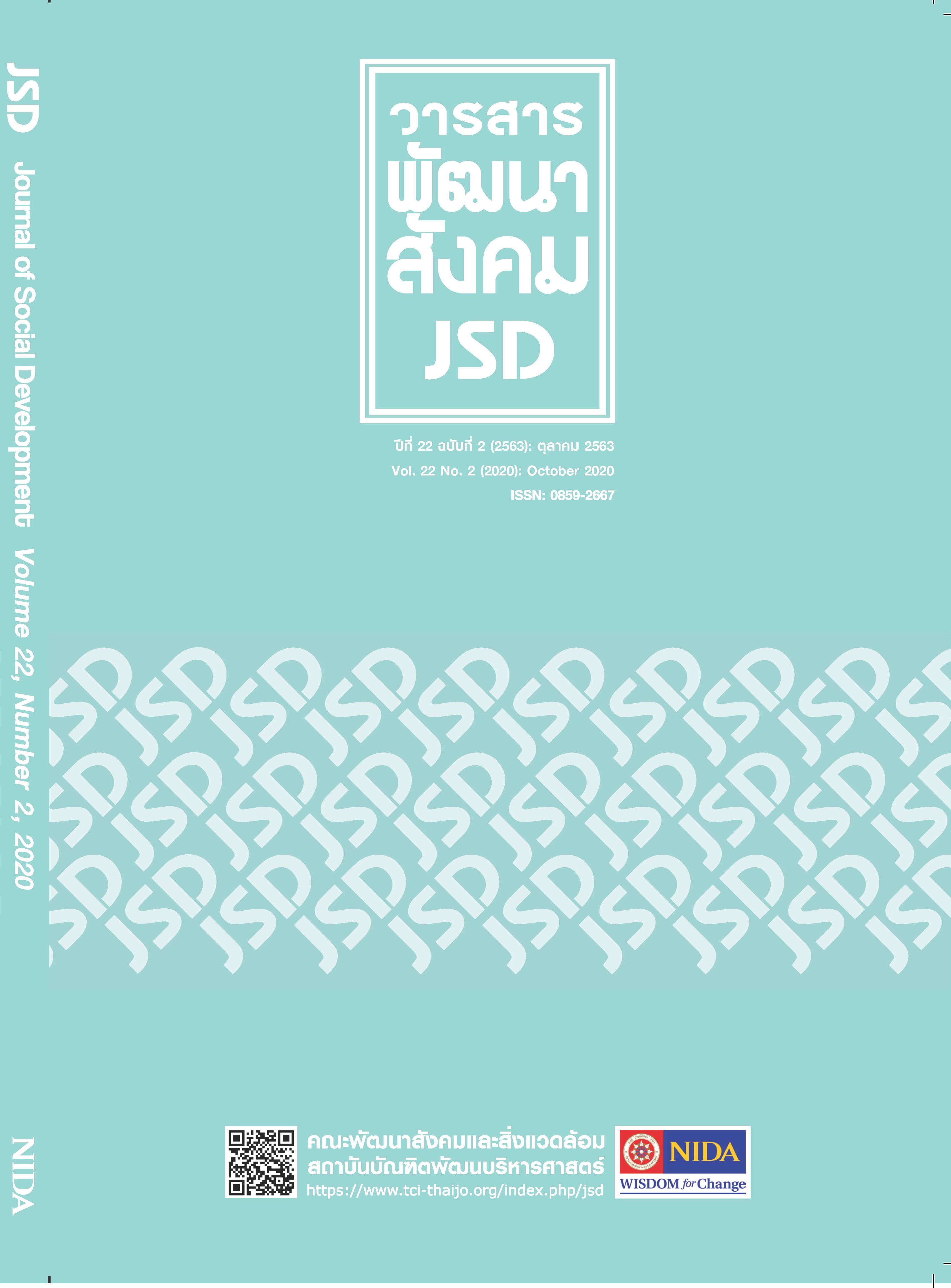Trust and the Success of Food Processing Clusters: A case study of Tha Sud Subdistrict Chiang Rai Province
Main Article Content
Abstract
province and to study conditional trust that promotes the success and strength of the cluster in Tha Sud Subdistrict community Chiang Rai province. The data was collected from 36 key informants by way of in-depth interviews, participatory observation, and documents by using an analysis, interpretation with descriptive statistics.
The research found that Cluster members of Tha Sud Subdistrict community collaborate to rely on and
support each other, appear both vertically and horizontally. To promote trust in the cluster to be successful and strong of the cluster group are found to be based on the original culture of the community. The formation of the group has the main objective to solve the problems of the cluster. That will benefit all parties. Also, leaders are honest, knowledgeable, capable of using on care, share, and fair management, and have a transparent and accountable management system that is an important condition. In addition, trust is the basis for helping dependence between group members and between cluster groups .It is the mainstay of the development of food processing cluster groups to drive together from Upstream Middle Stream and Downstream.
The most important suggestion; Creating trusting processes is a cornerstone of the development of food
cluster groups in the community. The government should play a role in promoting and supporting through various activities in accordance with the context of the community.
Article Details
References
Beaton, D. (2007). Trust within teams. Master’s thesis, Business, School of Management,
Queen land University of Technology.
Borum, R. (2010). The science of interpersonal trust. Mental Health Law & Ploicy Faculty
Publications.
Covey, S. (2008). The speed of trust: The one thing that changes everything. Power.
Fairholm, G. (1994). Leadership & the Culture of Trust. Westport: Connecticut: Greenwood Publishing Group,Inc.
Gitomer, J. (2008). Little Teal Book of Trust. Pearson Education,Inc. (1st ed.). Pearson Education.
Johnson, D. & Johnson, R. (1994). Leading the cooperative school (2nd ed.). Edina,MN: Interaction Book Company.
Keeraranon,P. (2009). Why is trust important? Retrieved from http://www.stou.ac.th/Schools/Shs/1_2552/Relax.htm
Kitisaknawin,C. (2009). Trust in the organization of Thailand Comparative study of government
organizations State Enterprise & Private Sector, Ramkhamhaeng University.
Lankton, N. & Mcknight, D. (2008). What Does it Mean to Trust Facebook? Examining Technology & Interpersonal Trust Beliefs. In AMCIS. https://doi.org/10.1145/1989098.1989101
Mayer, R., Davis, J. & Schoorman, F. (1995). AN INTEGRATIVE MODEL OF ORGANIZATIONAL TRUST.
Academy of Management Review. https://doi.org/10.5465/AMR.1995.9508080335
McKnight, D.& Chervany, N. (1996). The meaning of trust. Retrieved from http://www.misrc.umn.edu/ workingpapers/fullpapers./1996/9604_040100.pdf
McKnight, D. & Chervany, N. (2001). What trust means in e-commerce customer relationships:
An interdisciplinary conceptual typology. International Journal of Electronic Commerce. https://doi.org/10.1080/10864415.2001.11044235
Mink, O., Owen,k. & Mink, B. (1993). Developing High- Performance People:The Art of
Coaching. New York: Perseus Books.
Mishra, A. (1996). Organizational responses to crisis: The centrality of trust. In Trust in organizations:
Frontiers of theory and research.https://doi.org/10.1017/CBO9781107415324.004
Nasomchai,K. (2013). Trust with the application of work. Retrieved from http://www.tpa.or.th/writer/read_this_book
Phromsri,C. (2007). Organizational conflict management. Bangkok: X Peret.
Porter, M. (1990) “The Competitive Advantage of Nations”. London: Macmillan.
Reina, D. & Reina, M. (2000). Trust & Betrayal in the Workplace: Building Effective Relationships in Your Organization. Advances in Developing Human Resources. https://doi.org/10.1177/152342230000200112
Reynolds, L. (1997). The Trust Effect: Creating the High Trust, High Performance Organization.
London: Nicholas Brealey.
Robbins, S. & Judge, T. (2013). Organizational Behavior. Pearson. https://doi.org/10.1007/s12640-012-9328-5
Rotter, J. (1967). A new scale for the measurement of interpersonal trust. Journal of Personality. https://doi.org/10.1111/j.1467-6494.1967.tb01454.x
Shaw, R. (1997). Trust in the Balance: Building Successful Organizations on Results,Integrity
& Concern. San Francisco: Jossey-Bass.
UNIDO. (2001) “Development of Clusters and Networks of SMEs: The UNIDO Programme.” Prepared by the Private Sector Development Branch, Investment Promotion & Institutional Capacity Building Division.


